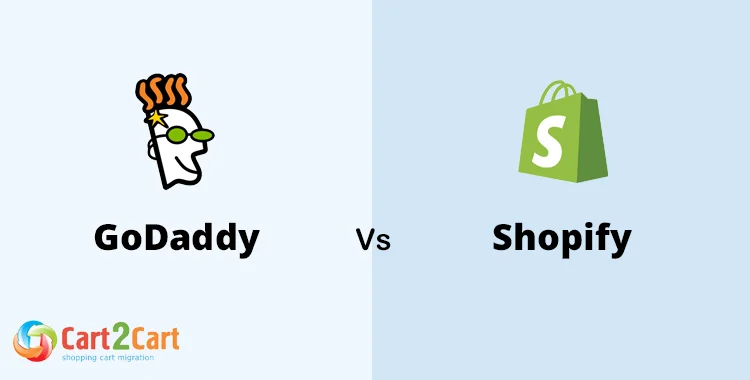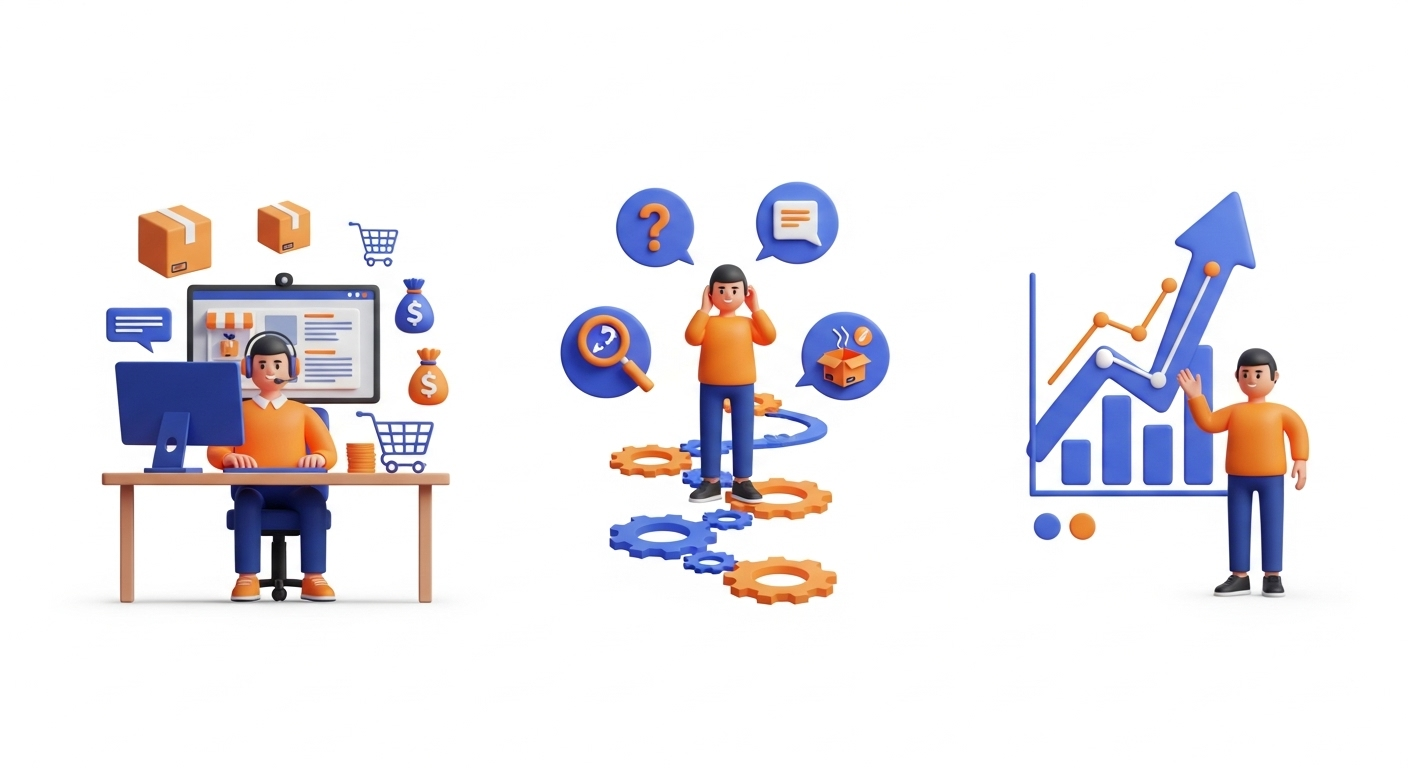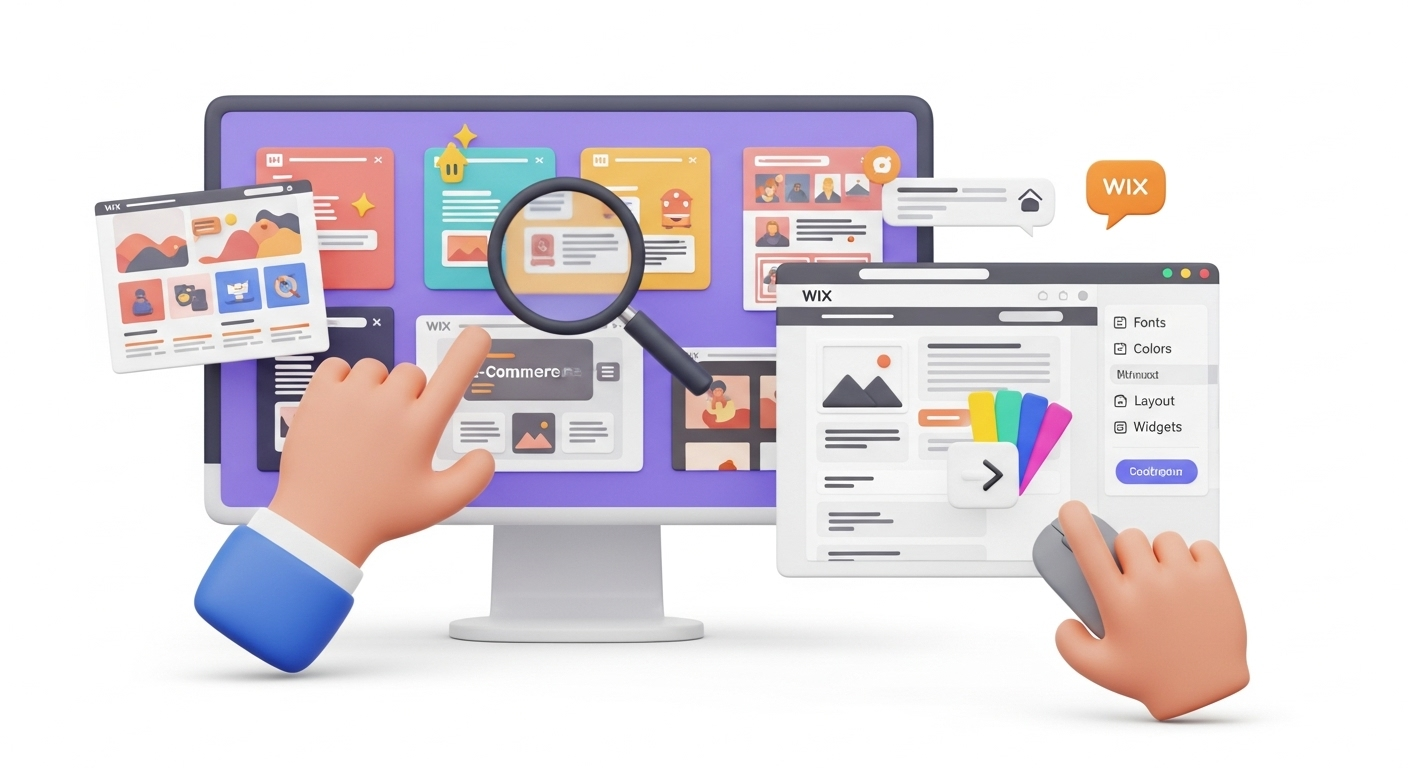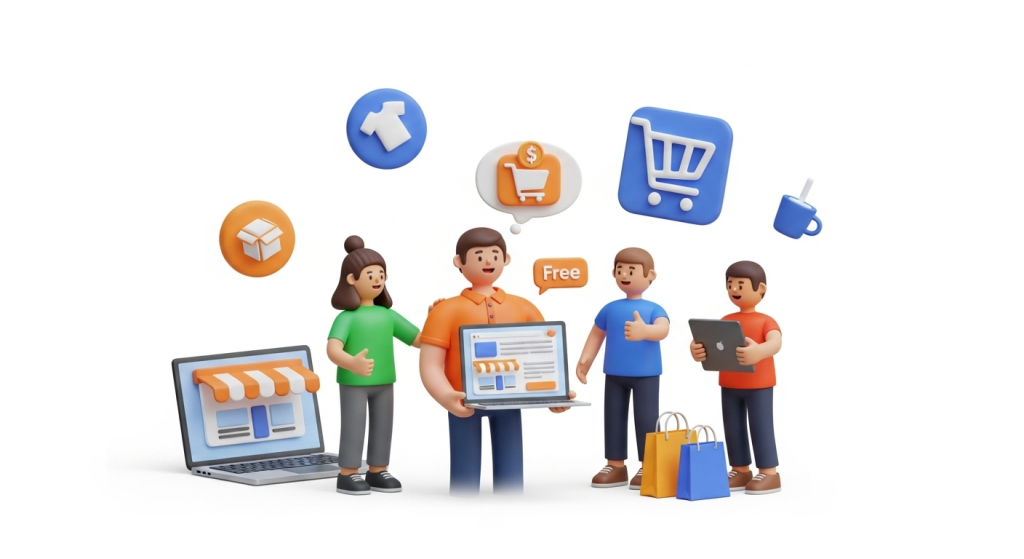Arizona-based GoDaddy started as a domain registrar and domain name provider in 1997. Today, tens of millions of registered domains use these services, and GoDaddy’s website builder powers millions of websites and online stores, according to recent industry data.
GoDaddy is a hosted solution, hosted by GoDaddy itself. For more insights on choosing between hosted and open-source options, see our guide on Open-Source vs. Hosted Shopping Carts.
On the other hand, Shopify is a cloud-based, all-in-one platform created in Canada in 2006 specifically for e-commerce. For those considering a platform switch, exploring our Shopify migration guides can provide valuable insights. Shopify is not a domain registrar; it is an e-commerce platform.
According to industry reports, Shopify powers millions of websites and has generated trillions of dollars in sales since its inception.
Shopify is a powerful e-commerce platform known for its ease of use, customization options, and wide range of e-commerce features that enable users to succeed online. For a comprehensive guide on transitioning to Shopify, check out our Migration to Shopify roadmap.
GoDaddy, on the other hand, is a straightforward website builder that can be used to build a simple website without all the bells and whistles, yet with everything you need to start selling online. For a comprehensive overview, consider our Universal eCommerce Migration Checklist. GoDaddy is a good choice for anyone who wants to feel free of a myriad of e-commerce features and just wants to get on with running a business online. In fact, the platform is an excellent choice for beginners because of its many helpful features.
Shopify vs GoDaddy Pros and Cons
When comparing Shopify and GoDaddy for your e-commerce needs, it's important to evaluate their pros and cons in various aspects of running an online store.
Shopify
Pros:
- User-Friendly Interface: Shopify offers an easy-to-use platform that simplifies store setup and management, even for beginners.
- Customization and Design: Shopify provides a variety of customizable templates and themes, allowing you to create a unique and professional-looking store.
- Marketing Tools: The platform includes integrated SEO and marketing tools to help you promote your store and increase visibility.
- Scalability: Shopify is suitable for businesses of all sizes and can grow with your business as you expand.
- Apps and Integrations: Shopify has a large app store with numerous third-party integrations for added functionality.
- Customer Support: Shopify offers 24/7 customer support through various channels, including chat, email, and phone.
Cons:
- Transaction Fees: Shopify may charge transaction fees if you don't use their payment gateway, which can add to your costs.
- Additional Costs: While the base plans are reasonably priced, premium themes and third-party apps may increase your monthly expenses.
- Limited Free Plan: Shopify doesn't offer a completely free plan, which might not suit very small businesses or startups with tight budgets.
GoDaddy
Pros:
- Ease of Use: GoDaddy offers a straightforward, easy-to-use platform that caters to beginners and non-technical users.
- All-in-One Solution: GoDaddy provides an integrated approach, combining domain registration, hosting, and website building into one package.
- Affordable Pricing: GoDaddy's pricing plans are generally budget-friendly, making it an attractive option for small businesses.
- Mobile App: GoDaddy offers a mobile app for managing your store on the go.
- Support: GoDaddy provides customer support through phone and chat, ensuring help is available when needed.
Cons:
- Limited Customization: GoDaddy's templates and themes may not offer the same level of customization as Shopify, which can limit your store's design options.
- Fewer Marketing Tools: While GoDaddy offers basic marketing tools, they may not be as robust as Shopify's, which could affect your ability to promote your store effectively.
- Scalability: GoDaddy's e-commerce solution may be more suitable for smaller businesses, as larger businesses might find it less scalable than Shopify.
In summary, Shopify is a robust e-commerce platform with a wealth of customization options, marketing tools, and scalability, making it a great choice for businesses of all sizes. GoDaddy, on the other hand, provides an easy-to-use, affordable option that is well-suited for smaller businesses and those new to e-commerce. Your decision will depend on your business goals, technical skill level, and budget.
Understanding the Target Audience of Each Platform
GoDaddy's target audience is people who want an easy way to build a website and want to avoid paying a premium price for the privilege. The platform offers affordable pricing plans, an easy-to-use editor, e-commerce functionality, SEO assistance, and an intelligent learning program called GoDaddy Insight that uses data from millions of websites to generate insights that help GoDaddy users with their online businesses. For those migrating from Shopify to WooCommerce, GoDaddy provides tools and resources to make the transition smoother.
GoDaddy's prime target audience is website owners who want to use GoDaddy as a web host. In that case, they get ready access to everything needed for hosting, including an SSL certificate, and a domain name. To ensure a smooth transition, it's essential to prepare your source store for migration.
Shopify's target audience is so broad it may be wrong to call it a target audience. Let's put it this way: Shopify has a vast range of advanced e-commerce features that, combined with its ease of use, enables anyone, with or without technical know-how, to build an online store and run a successful online business. You can build a small store, and know that Shopify has everything you need to scale to whatever size you visualize. For specific platform guidance, review our guide on importing data to Shopify. Shopify also supports seamless solutions to migrate orders from WooCommerce to Shopify, making it easier for store owners to transition without losing valuable data.
If you have the dream and are prepared to put in the work, this platform and everything it offers will help you get there.
To summarize: GoDaddy is for beginners who want a simple online store quickly, and Shopify is for all individuals, entrepreneurs, and companies serious about running an online business.
GoDaddy vs Shopify. Key features & functionality
Ease of Use
Shopify's drag-and-drop editor makes it easy to build a store, even for beginners or people with little or no technical skills, but GoDaddy is easier to use than Shopify.
In our experience, Shopify has a clean, clear, and simple interface and an easy-to-use editor that makes building an online store relatively easy and stress-free. But it takes a while to get used to the workflow, which can be confusing, especially for beginners.
Because of how the back and front end work, you can't see how the changes you make will appear on your website. It would be easier if you could see changes in real-time. Having said that, once you've worked with it for a while, you get used to it, and you can progress faster
However, you certainly won't have a website in ten minutes, which is what's possible with GoDaddy.
GoDaddy uses ADI to create your online store in a matter of minutes, and it represents the quickest and easiest way to get your e-commerce store up and running.
If you want more customization, insert elements, change the fonts, and take a few other steps. However, the platform offers limited customization possibilities. From what we have seen, if you want a website that really represents you creatively and uniquely, GoDaddy is not for you.
GoDaddy will give you a simple store in record time, but it may not be as beautiful as you might want. For ease of use, you are sacrificing creative control. If design flexibility is a key concern, consider exploring options for custom or pre-made e-commerce templates.
So, in the final analysis, GoDaddy is easier than Shopify to use, but it comes at a price.
Design and Customization
Both platforms make it easy to design an online store, Shopify with its drag-and-drop editor and GoDaddy with its ADI. However, when it comes to customization, GoDaddy has nothing on Shopify.
With GoDaddy, you don't have access to the source code, so you can only really change something fundamental about your store. In addition, the ADI-assisted store creation is designed to take control of the entire store creation process, so we found we had minimal customization options after the ADI presented us with a website.
With Shopify, it's an entirely different story. The platform gives you full access to the CSS and HTML code in Shopify so can thoroughly customize your template.
In addition, you can customize your store extensively with the help of the Shopify app store. The app store has thousands of apps, with thousands available for free or offering free plans. You will agree that this offers unlimited customization possibilities.
In contrast, GoDaddy doesn't have an app store and allows almost no integrations.
In GoDaddy’s favor is the range of industry-specific websites it can create. For every industry it caters to, the platform has 19 theme variations, which comes down to about 1,500 websites.
In terms of design and customization, Shopify is clearly the best option.
E-Commerce Features and Capabilities
Shopify has some of the most comprehensive lists of e-commerce tools. The platform has all the e-commerce features you need to run a profitable online business. Shopify’s sales tools and features enable:
- Apps
- Product Management
- Shipping
- Multiple payment processors
- Multi-channel Integration
- POS
- Dropshipping
- Digital Selling
- Abandoned cart recovery
For businesses with unique requirements, our migration customization service can tailor your setup.As mentioned before, Shopify has thousands of apps. There are apps to increase sales, for social media selling, abandoned cart apps, upsell and cross-sell apps, and hundreds more.
Shopify allows its users unlimited products and multiple product variants, making matters easier with integration with orders and shipping apps. It comes with its own abandoned cart recovery feature, which assists with completing purchases. The platform also makes refunds as easy as possible.
The platform has arrangements with leading shipping providers to offer its users the best possible shipping rates. The platform also offers multiple payment options in addition to Shopify Payments. You don't need to pay transaction fees if you choose Shopify Payments.
GoDaddy offers fewer payment processors than Shopify — customers can checkout using PayPal, Apple Pay, and Square. Understanding currency migration is also crucial for international sales. GoDaddy also offers fewer shipping options. Store owners can ship via USPS or UPS.
Our investigation has shown that Shopify enables dropshipping, but GoDaddy only accommodates you if you want to start a dropshipping business.
All in all, Shopify offers superior e-commerce features and capabilities.
Pricing and Cost
Overall, Shopify is relatively good value for money, with a range of plans at different price points for every size store. Shopify customers get access to some of the best e-commerce tools on the market.
The three main Shopify plans are:
- Basic: $39 per month
- Shopify: $105 per month
- Advance Shopify: $399 per month
There is also the Shopify Plus plan for large enterprises. The price is available upon request.
Shopify’s plans are some of the more expensive on the market, but you pay for what you get: a range of advanced e-commerce features that will assist you with running a successful online business.
GoDaddy has four pricing plans, but only these two let you create a fully-functional, e-commerce store:
- Commerce: $24.99 per month
- Commerce Plus: $29.99 per month
GoDaddy's plans are cheaper than Shopify’s, but they don't offer nearly the same sales features, and none give you a genuinely scalable store.
SEO and Marketing Capabilities
As a result of using this product, we have found that GoDaddy’s SEO tools are aimed at relative beginners. The built-in SEO wizard makes some elementary suggestions to help you with the site’s keywords and on-page content. The tool scrutinizes your content and then suggests some keywords for you.
To assist further with SEO, the GoDaddy builder provides a secure https:// connection and an automatically generated XML sitemap so search engines can crawl and index website pages effectively.
However, since you can't access your code, and GoDaddy doesn't support apps to enhance SEO, what you can do to make your site more SEO-friendly is seriously hampered.
On the other hand, Shopify gives you control of your site's SEO. The platform lets you change page titles and meta descriptions and configure redirects. And unlike most other e-commerce platforms, it facilitates integration with the Yoast SEO tool.
All in all, Shopify is significantly better with SEO than GoDaddy.
App Store and Integrations
In terms of an app store and integrations, there is no contest whatsoever. Shopify has an app store with thousands of apps that enable every conceivable integration. GoDaddy doesn't have an app store and allows almost no integrations.
Support and Resources
Both platforms offer comprehensive customer support. GoDaddy users enjoy live chat and phone support in almost all regions. GoDaddy also has a support account on Twitter and a help center with articles and video tutorials.
Shopify support is excellent. The company has a professional team available 24/7 for phone, email, and live queries. In addition, there are community forums, video tutorials, a help center, and API documentation.
Overall, both Shopify and GoDaddy offer comprehensive support.
Scalability and Growth Potential
To facilitate the scalability of an online store, an e-commerce platform must be equipped to handle high traffic volumes, sales spikes, increased inventory, order fulfillment, plus more customer demands.
Shopify is a scalable platform that is equipped to handle these demands. Store owners can start with Shopify’s basic plan and upgrade to higher plans with more advanced e-commerce capabilities. The platform is home to many enterprise-level businesses online.
GoDaddy has limited ability for growth. GoDaddy Commerce is an easy, accessible builder but only accommodates small businesses. For instance, it has limitations on transaction volume. For businesses looking to expand, considering an extended data migration service can be beneficial.
Security and Reliability
Shopify is a hosted e-commerce solution, which means Shopify is responsible for security. That includes
- SSL certificates
- PCI compliance
- 2-factor authentication
- Keeping themes or plugins up to date
Shopify has one drawback in this regard, though. The platform doesn't do backups of your store automatically. You have to back up your store every time you change something manually.
GoDaddy is also a secure platform. It offers a free SSL certificate, firewall, and malware scanning. Advanced Email Security also keeps all emails from and to you free of all breaches.
Unlike Shopify, GoDaddy users don't have to back up their stores constantly. GoDaddy will automatically do that for them.
Both GoDaddy and Shopify provide their users with secure sites.
Choosing the Right E-Commerce Platform
Factors to Consider in the Decision-Making Process
When choosing an e-commerce platform, you must consider your business needs, budget, technical capability, and the required features. In terms of the platform itself, you should consider the following questions:
- Is it an open-source platform or a cloud-based and hosted website builder?
- What is the focus of the platform?
- Does it require many technical skills to operate, or is it easy to use?
- What user experience does it offer?
- Is the price within your budget?
- Is it a secure platform?
- Does the platform enable SEO?
- Does the checkout offer a smooth user experience?
- How are products and orders managed?
- What payment gateways will you have access to?
- What are the shipping integrations like?
- Does it offer practical marketing tools?
- Is there an app store?
- Can you integrate with third-party applications?
- Is customer support reliable and sufficient?
- Are the themes mobile-friendly?
Recommendations Based on Different Business Needs
Choose GoDaddy if
- If you want to start really small, paying nothing – using the platform for free is possible.
- You need e-commerce features that are easy to use
- You want to get your store online fast and need more time or interest to build a bespoke store.
- You are not planning to have a massive store with many products.
- You want to avoid paying a premium to send out marketing emails.
- You want to avoid regularly backing up your store.
- You need powerful image editing tools.
- You don't want to pay transaction fees using a third-party payment gateway.
Use Shopify if
- You have ambitions to build an online empire.
- You need advanced e-commerce capabilities.
- You want to sell internationally in multiple currencies and languages.
- You want to start a dropshipping business.
- You need more advanced SEO features. GoDaddy offers SEO for beginners.
- You want to benefit from apps to customize your store and have more options for your business operations. GoDaddy doesn't have an app store and offers limited integrations.
- If you need more payment gateways than GoDaddy can offer.
- You want to have access to automated sales tax features.
Conclusion
Based on our observations, Shopify and GoDaddy are platforms that help users create e-commerce stores, but they have different features, pricing, and design options. Shopify has more advanced e-commerce features which support stores with large product catalogs and high traffic volumes. It also has a large app store with thousands of apps that help store owners customize their stores precisely as they want.
GoDaddy is cheaper and easier to use than Shopify, and all its themes are free, but the platform is not built to allow online stores to grow. It has limitations on transaction volume and integrations with apps that could help a store to grow and scale.
You can have an online business with both platforms, but Shopify is the one that has more features to help you succeed.
FAQs
What is the difference between GoDaddy and Shopify?
Shopify was built with e-commerce as the foundation. It is aimed at helping users to run a successful online business. GoDaddy is an easy-to-use platform for people wanting to get a website up and running quickly. E-commerce is not its prime aim.
Can I switch from GoDaddy to Shopify?
Yes, you can. You can use a shopping cart migration application like Cart2Cart to handle your store migration safely and securely.
Can you use GoDaddy and Shopify together?
Yes, you can. If you have an existing GoDaddy domain name, you can connect your Shopify store to it.
Leave a Reply Cancel reply
Shopify is a powerful and flexible e-commerce platform that suits businesses of all sizes, offering extensive customization options and strong marketing tools. GoDaddy, on the other hand, provides an easy-to-use, budget-friendly solution ideal for smaller businesses and those new to e-commerce. Your choice will depend on your business goals, technical skills, and budget.
What can we do for you?
If you want to migrate your GoDaddy e-commerce store to Shopify, you can use Cart2Cart, a SaaS service that allows you to transfer your database, data, and settings to a new platform with ease and security. You can also try a free demo migration to see how it works.
Monthly Update – January 2026
As we step into 2026, the e-commerce landscape is rapidly evolving, driven by advancements in AI and a strong emphasis on personalized shopping experiences. Businesses are increasingly leveraging artificial intelligence to offer hyper-targeted product recommendations, dynamic pricing, and predictive customer service, significantly enhancing engagement and conversion rates. Platforms that facilitate robust AI integration for analytics and customer interaction are becoming indispensable. Furthermore, the push for sustainability continues, with consumers demanding transparency and eco-friendly practices from brands. E-commerce solutions that support integrated sustainable supply chain management, carbon footprint tracking, and ethical sourcing tools are gaining a significant competitive advantage.
Another key trend is the growth of niche marketplaces and community-driven commerce. Merchants are exploring specialized platforms that cater to specific interests, allowing for deeper customer connections and tailored offerings beyond mainstream marketplaces. This shift requires platforms with flexible architecture and strong API capabilities to connect with diverse third-party tools and services. Staying ahead means adopting technologies that notophener streamline operations but also resonate with evolving consumer values and digital behaviors. For more details, explore our FAQ section or schedule a call with a migration expert.








